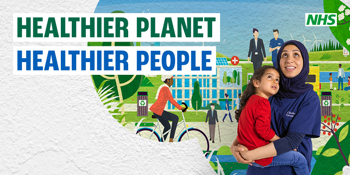Cheshire and Merseyside’s green future
Monday, 7 November 2022

Climate change poses a major threat to our health as well as our planet. The environment is changing, that change is accelerating, and this has direct and immediate consequences for our patients, the public and the NHS. As world leaders meet in Egypt for the annual UN Climate Change Conference (COP27) to agree and update on measures to tackle climate change, we want to take the opportunity to share the NHS work underway locally.
NHS Cheshire and Merseyside Integrated Care System is committed to achieving net zero by 2040 (or earlier) in line with the national ambitions of NHS England and NHS Improvement.
In June 2022, to mark Clean Air Day, we published our first System Green Plan which outlines our commitment to deliver sustainable and high-quality services for the people of Cheshire and Merseyside and highlights the ways in which we are working with our partners to positively impact the wider determinents of health to address health inequalities and to embed social value into every aspect of our work.
The System Green Plan features and combines targets from all our 18 Hospital Trust Green Plans as well as targets for General Practices, and details key areas of focus including adapting to the local impacts of climate change, improving biodiversity and green spaces and their associated health benefits, transforming the way we use technology to provide healthcare, decarbonising NHS estates, enhancing sustainable food in hospitals, reducing the environmental impact of medicines and anaesthetic gases, phasing out single use plastics, and improving the way both staff and patients travel when accessing health services.
In order to achieve our commitments as an Integrated Care System, we are working with partners in new and innovative ways, including local Councils, the NHS Innovation Agency, and Liverpool John Moore’s University, to improve the ways in which we provide patient care whilst reducing our environmental impact.
Here are just a few examples of the changes already underway:
- St Catherine’s Health Centre, Wirral, installed 306 solar panels, generating an estimated 84,600 kilowatts per hour annually – enough to power 21 houses for one year! This clean energy generation will help to avoid over 27 tonnes of carbon dioxide emissions each year. (Equivalent to travelling 67,000 miles in a car.)
- Desflurane is an anaesthetic gas 2540 times more potent as a greenhouse gas than an equivalent mass of carbon dioxide (CO2). A 240mL bottle of desflurane, completely vaporised will produce the equivalent of 886kg of carbon dioxide - the equivalent of driving 3072 miles from London to Naples and back, in a petrol engine car! NHS Trusts across Cheshire and Merseyside have reduced desflurane usage to just 4% of all anaesthetic gases used, exceeding NHS England’s target of 5%, with most Trusts now phasing it out completely.
- Nitrous oxide (‘gas and air’) is a greenhouse gas almost 300 times more potent than carbon dioxide. Over the past 4 years Cheshire and Merseyside Trusts have reduced the use of nitrous oxide by the equivalent of 443 tonnes of CO2 – the same as charging almost 54 million smartphones!
- Cycle to work schemes – staff across Cheshire and Merseyside have access to cycle to work schemes and are encouraged to use public transport (where appropriate) to undertake journeys to and from work. It improves health and reduces air pollution in and around our healthcare sites.
- Liverpool Health and Chest Hospital NHS Foundation Trust introduced reusable theatre gowns, saving over 23 tonnes of carbon dioxide emissions each year (equivalent to 57,000 miles in a car), and also saved the Trust more than £22,000 which was reinvested into providing patient care.